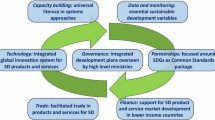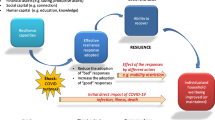Abstract
Studies that attribute energy poverty to a lack of technical resources abound in Zimbabwe. However, such line of reasoning falls short of giving a rigorous analysis of the existing political-economic factors and scalar politics. These include power dynamics, gender relations, class, historic patterns of dominance and marginalisation at different geographical scales and the discourse on energy poverty. Accordingly, a political ecology framework can address these theoretical gaps given its expansive scope. Using a qualitative approach, a political ecology analysis of the Zingondi Resettlement Area in Zimbabwe illuminates the interaction between these factors. Furthermore, it extends the argument through a Foucauldian view on apparatus of security in order to understand how the state uses its calculated power to address energy poverty. It concludes that energy poverty is a processual outcome, which is socially constructed. Therefore, there is need to pay attention to the complex and diverse nature of rural development. This includes embracing a development with and for the people approach, which takes into account pertinent aspects of the intended beneficiaries’ contexts.
Similar content being viewed by others
References
Baker, L. (2015). The evolving role of finance in South Africa’s renewable energy sector. Geoforum, 64, 146–156.
Baker, L., Newell, P., & Phillips, J. (2014). The political economy of energy transitions: The case of South Africa. New Political Economy, 19(6), 791–818.
Bernestein, H. (1979). African peasants: A theoretical framework. The Journal of Peasant Studies, 6(4), 421–443.
Blaikie, P. (1985). The political economy of soil erosion in developing countries. Routledge.
Blaikie, P., & Brookfield, H. (1987). Land degradation and society. Methuen.
Boardman, B. (2013). Fixing fuel poverty: Challenges and solutions. Earthscan.
Bond, P. (2006). Looting Africa: The economics of exploitation. Zed Books.
Braun, V., & Clarke, V. (2006). Using thematic analysis in psychology. Qualitative Research in Psychology, 3(2), 77–101.
Bridge, G., Özkaynak, B., Turhan, E., & Wyeth, R. (2018). Towards a political ecology of the EU Energy Policy. In C. Foulds & R. Robinson (Eds.), Advancing energy policy: lessons on the integration of social sciences and humanities (pp. 163–175). Springer International Publishing AG.
Bryant, R. L. (Ed.). (2015). The international handbook of political ecology. Edward Elgar.
Bryant, R. L., & Bailey, S. (1997). Third world political ecology. Routledge.
Burawoy, M. (1985). The politics of production: Factory regimes under capitalism and socialism. Verso.
Buzar, S. (2007). When homes become prisons: The relational spaces of post- socialist energy poverty. Environment and Planning A, 39, 1908–1925.
Cederlöf, G. (2021). Out of steam: Energy, materiality, and political ecology. Progress in Human Geography, 45(1), 70–87.
Chambers, R. (1995). Poverty and livelihoods: Whose reality counts? Environment and Urbanisation, 7(1), 173–204.
Chipango, E. F. (2018a). Reinterpreting energy poverty in Zimbabwe: A scalar perspective. Journal of Political Ecology, 25(1), 205–220.
Chipango, E. F. (2018b). The rural electrification-ecological sustainability nexus in Zimbabwe, PhD thesis, University of Johannesburg, http.//hdl.handle.net/10210/278975
Clarke-Sather, A. (2017). State power and domestic water provision in semi-arid Northwest China: Towards an aleatory political ecology. Political Geography, 58(2017), 93–103.
Cook, I. (2004). Follow the thing: Papaya. Antipode, 36(4), 642–664.
Cotton, M., Kirshner, J., & Salite, D. (2019). The political economy of electricity access: Lessons from Mozambique. Oxford: Research Report, Oxford Policy Management.
Davidson, O., & Mwakasonda, S. A. (2004). Electricity access to the poor: A study of South Africa and Zimbabwe. Energy for Sustainable Development, 8(4), 26–40.
Escobar, A. (1999). After nature: Steps on an antiessentialist political ecology. Current Anthropology., 40(1), 1–16.
Fine, B. (1997). Industrial and energy policy. In J. Michie & V. Padayachee (Eds.), The political economy of South Africa’s transition: Policy perspectives in the late 1990s (pp. 125–149). London: Dryden Press.
Fine, B. (2008). The minerals-energy complex is dead: Long live the MEC? Unpublished paper for the Amandla Colloquium.
Foucault, M. (1998). The will to knowledge: History of sexuality, (Vol. 1). Penguin Books.
Foucault, M. (2007). Security, territory, population. Lectures at the College de France 1977–1978. Trans. Burchell, G. New York: Palgrave Macmillan.
Gibson, W., & Brown, A. (2009). Working with qualitative data. Sage Publications.
Grosz, E. (1994). Volatile bodies: Towards a corporeal feminism. Indiana University Press.
Guizzo, D., & de Lima, I. V. (2015). Foucault’s contributions for understanding power relations in British classical political economy. Economia, 16(2015), 194–205.
Harvey, D. (1973). Social justice and the city. Basil Blackwell Publishers.
Harvey, D. (1974). Population, resources and the ideology of science. Economic Geography, 50(3), 256–277.
Harvey, D. (1998). What’s green and makes the environment go round? In F. Jameson, M. Miyoshi, & N. C. Durham (Eds.), The cultures of globalisation (pp. 327–355). Duke University Press.
Harvey, D. (2000). Spaces of hope. Edinburgh University Press.
Harvey, D. (2003). The new imperialism. University Press.
Harvey, D. (2006). Neoliberalism as creative destruction. Annals of the American Academy of Political and Social Science, 610, 22–44.
Heynen, N. C. (2003). The scalar production of injustice within the urban forest. Antipode, 35, 980–998.
Huber, M. (2015). Energy and social power: From political ecology to the ecology of politics. In T. Perreault, G. Bridge, & J. McCarthy (Eds.), The routledge handbook of political ecology (pp. 481–492). London: Routledge.
Hull, E. H. (1939). Engineering: Ancient and modern. Scientific Monthly, 49(5), 460–463.
Kaseke, N. (2013). Emergence of electricity crisis in Zimbabwe, reform, response and cost implications. Journal of Business Management and Social Science Research, 2(1), 1–16.
Krausmann, F., Erb, K., Gingrich, S., & Haberl, H. (2013). Global human appropriation of net primary production doubled in the 20th century. Proceedings of the National Academy of Sciences, 110(25), 10324–10329.
Mangwengwende, S. E. (2005). Increasing electricity access while ensuring financial viability: A perspective from the African Electricity Industry, Global network on energy for sustainable development (GNESD): Workshop on electricity and development, Nairobi, 13–14 July 2005.
Marx, K. (1904). A contribution to the critique of political economy, Chicago, 111, Kerr.
Masud, J., Sharan, D., & Lohani, B. N. (2007). Energy for all: Addressing the energy, environment, and poverty nexus in Asia. Asian Development Bank.
Mbohwa, C. (2002). Zimbabwe: An assessment of the electricity industry and what needs to be done. Electricity Journal, 15(7), 82–91.
Mehta, L. (2010). The limits to scarcity: Contesting the politics of allocation. Earthscan.
Ministry of Energy and Power Development. (2012). National energy policy. Harare: Government of Zimbabwe.
Munro, P. G. (2021). Energy political ecologies in the South Pacific: The politics of energy transitions in Vanuatu. Cambridge Journal of Regions, Economy and Society, 14, 361–378.
Munro, P., van der Horst, G., & Healy, S. (2017). Energy justice for all? Rethinking sustainable development goal7 through struggles over traditional energy practices in Sierra Leone. Energy Policy, 105(2017), 635–641.
Neumann, R. P. (2005). Making political ecology. Hodder Arnold.
Paulson, S., Gezon, L. L., & Watts, M. (2003). Locating the political in political ecology: An introduction. Human Organisation, 62(3), 205–217.
Power, M., Newell, P., Baker, L., Bulkeley, H., Kirshner, J., & Smith, A. (2016). The political economy of energy transition in Mozambique and South Africa: The role of rising powers. Energy Research and Social Science, 17(2016), 10–19.
Robbins, P. (2012). Political ecology (2nd ed.). Chichester.
Robbins, P. (2015). The trickster science. In T. Perreault, G. Bridge, & J. McCarthy (Eds.), The routledge handbook of political ecology (pp. 89–98). London: Routledge.
Robbins, P. (2020). Political ecology: A critical introduction (3rd ed.). Wiley-Blackwell.
Rowlands, I. H. (1994). International influences on electricity supply in Zimbabwe. Energy Policy, 22(2), 131–143.
Sharife, K., & Bond, P. (2011). Above and beyond South Africa’s minerals-energy complex. In D. Pillay, J. Daniels, P. Naidoo, & R. Southall (Eds.), New South African review 2, new paths, old compromises. Wits University Press.
Sharma, A. (2020). ‘We do not want fake energy’: The social shaping of a solar micro-grid in rural India. Science, Technology and Society, 25(2), 308–324.
Söderholm, P. (1999). The political economy of power generation in Zimbabwe since 1980. Natural Resources Forum, 23(1999), 335–346.
Thompson, E. P. (1964). The making of the English working class (1st ed.). New York, Vintage Books: Vintage edition.
van den Bold, M. (2021). In pursuit of diverse energy futures: The political economy of electricity in Senegal. EPE: Nature and Space, 0(0), 1–13.
Global Witness. (2012). Financing a parallel government? The involvement of the secret police and military in Zimbabwe’s diamonds, cotton and property sectors, https: //www.globalwitness.org/en/campaigns/conflictdiamonds/zimbabwe/financing-parallel-government/ accessed: 3 March 2021.
Wolff, J., & de-Shalit, A. (2007). Disadvantage. Oxford: Oxford University Press.
Zimmermann, E. W. (1951). World resources and industries: A functional appraisal of the availability of agricultural and industrial resources (2nd ed.). Harper and Brothers.
Author information
Authors and Affiliations
Corresponding author
Ethics declarations
Conflict of interest
The author declares that they have no conflict of interest.
Ethical approval
The author declares that she has complied with all the ethical standards as it is required by journal of GeoJournal.
Additional information
Publisher's Note
Springer Nature remains neutral with regard to jurisdictional claims in published maps and institutional affiliations.
Rights and permissions
About this article
Cite this article
Chipango, E.F. Political ecologies of energy poverty in Zimbabwe. GeoJournal 87, 5197–5211 (2022). https://doi.org/10.1007/s10708-021-10566-4
Accepted:
Published:
Issue Date:
DOI: https://doi.org/10.1007/s10708-021-10566-4





